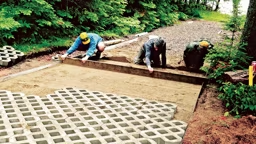A seal coat can make old asphalt appear new and surface-protected. However, there are a few things you should know before buying supplies or calling a contractor. For starters, seal coat comes in two primary varieties: coal tar-based and asphalt-based.
For years, coal tar, a by-product of coal processing, has been widely used due to its ability to resist deterioration and because it’s easy to apply.
However, the coal-tar pitch used in seal coat contains high levels of a variety of chemicals collectively known as polycyclic aromatic hydrocarbons, or PAHs. Coal-tar pitch itself is a known carcinogen, and many of the PAH chemicals are believed to be human carcinogens. Researchers are currently investigating PAH connections to prenatal and early childhood developmental problems. People can be exposed to PAHs by inhaling fumes or dust, and they can be absorbed through skin that comes into contact with the dried product.
Once dry, chemicals in coal-tar sealants continue to leach into the environment. Dried seal coat wears off into particles that are carried by rain runoff and wind to nearby streams, lakes and stormwater ponds. Fish swimming in PAH-polluted water can exhibit fin erosion, liver abnormalities, and skin tumors. Many areas of the U.S. report increasing concentrations of PAHs in lakes and stormwater ponds. Over half of these elevated concentrations are traced to coal-tar seal coats. High levels of PAHs can make disposing of dredge material nearly three times as expensive.
Alternative sealants are available. Asphalt-based sealants contain far lower PAH levels. A study conducted in Austin, Texas, revealed that asphalt-based seal coat products contained as little as 1⁄1,000 the PAH level of coal-tar seal coats. In performance and cost, the two products are similar.
Many professional companies and private applicators have voluntarily chosen to use only asphalt-based products, and several national home improvement retailers, including Lowes and Home Depot, have chosen to stop selling coal-tar sealants. Since Austin, Texas, became the first U.S. city to ban coal-tar sealants in 2005, many areas have joined in, including 28 Minnesota communities.
However, coal-tar sealants do remain available for purchase at other retailers, and are still used by some contractors.
When it’s time to build a new driveway, consider using material like concrete, stone or permeable pavers that don’t require a sealer. And always pick asphalt-based or other alternatives to coal tar when choosing a seal coat. It’s a choice that helps to protect humans and the environment.
Cristina Villella is a Green Corps service member at Minnesota Sea Grant, working to preserve and protect the environment.
RESOURCES
- Minnesota Sea Grant, www.seagrant.umn.edu
- U.S. Geological Survey, http://water.usgs.gov/nawqa/asphalt_sealers.html
 Thinkstock.com
Thinkstock.com 










